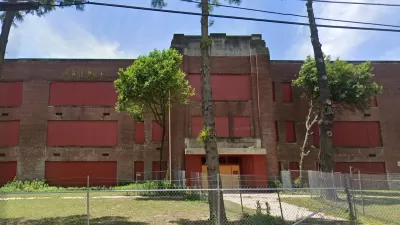One of the America's most unhealthy, auto-centric cities has seen the light - the handlebar headlight that is - with a push to improve its bicycling infrastructure as a means of economic development.
The public shaming of Memphis as one of the worst cities in America for cyclists wasn't enough to jolt the city into action, but rather it was the political will of a new Mayor who spied an opportunity for economic development, improving public health, and increasing community bonds and environmental stewardship. At the urging of Mayor A. C. Wharton Jr., and with funding from stimulus money and other federal sources, Memphis has increased its share of bike lanes from a mile and a half in 2008 to 160 miles (50 of which are dedicated to bikes) today, reports Bobby Allyn.
"City planners are using bike lanes as an economic development tool, setting the stage for new stores and enhanced urban vibrancy, said Kyle Wagenschutz, the city’s bike-pedestrian coordinator, a position the mayor created."
“The cycling advocates have been vocal the past 10 years, but nothing ever happened,” Mr. Wagenschutz said. “It took a change of political will to catalyze the movement.”
But the investment of political and financial capital in increasing the city's bike-friendliness hasn't appealed to everyone. According to Allyn, merchants have clashed with bike advocates over proposals for new lanes.
"Tensions aside, the mayor’s office says that the potential economic ripple effect of bike lanes is proof that they are a sound investment."
FULL STORY: Sprawling Memphis Aims to Be a Friendlier Place for Cyclists

Maui's Vacation Rental Debate Turns Ugly
Verbal attacks, misinformation campaigns and fistfights plague a high-stakes debate to convert thousands of vacation rentals into long-term housing.

Planetizen Federal Action Tracker
A weekly monitor of how Trump’s orders and actions are impacting planners and planning in America.

In Urban Planning, AI Prompting Could be the New Design Thinking
Creativity has long been key to great urban design. What if we see AI as our new creative partner?

King County Supportive Housing Program Offers Hope for Unhoused Residents
The county is taking a ‘Housing First’ approach that prioritizes getting people into housing, then offering wraparound supportive services.

Researchers Use AI to Get Clearer Picture of US Housing
Analysts are using artificial intelligence to supercharge their research by allowing them to comb through data faster. Though these AI tools can be error prone, they save time and housing researchers are optimistic about the future.

Making Shared Micromobility More Inclusive
Cities and shared mobility system operators can do more to include people with disabilities in planning and operations, per a new report.
Urban Design for Planners 1: Software Tools
This six-course series explores essential urban design concepts using open source software and equips planners with the tools they need to participate fully in the urban design process.
Planning for Universal Design
Learn the tools for implementing Universal Design in planning regulations.
planning NEXT
Appalachian Highlands Housing Partners
Mpact (founded as Rail~Volution)
City of Camden Redevelopment Agency
City of Astoria
City of Portland
City of Laramie





























